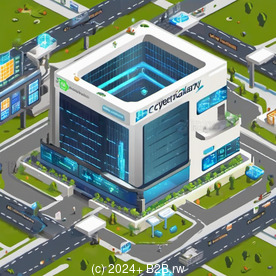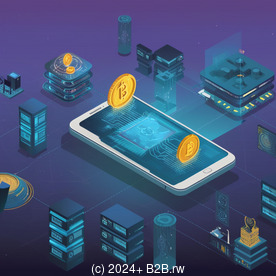
A Comprehensive Overview of E-commerce and E-business




Understanding E-commerce and E-business
E-commerce, or electronic commerce, refers to the buying and selling of goods and services over the internet. This expansive term encompasses everything from retail sales and online marketplaces to electronic payments and supply chain management. E-business, on the other hand, includes all business processes that utilize internet technology, going beyond sales to involve operational processes such as managing supply chains, managing customer relationships, and conducting market research.
In the modern digital age, understanding the nuances between e-commerce and e-business is crucial for business owners and marketers. E-commerce might be viewed as a crucial component of e-business, yet the latter opens up possibilities for optimizing overall business efficiency through integrated digital solutions. This duality is critical as it reflects how businesses are leveraging technology to thrive in an increasingly interconnected world.
Furthermore, as technology continues to evolve, the gap between traditional business and e-business narrows, pushing traditional businesses to adapt or face obsolescence. The growth of platforms like Amazon and Alibaba exemplifies how e-commerce has shifted from niche markets into mainstream channels, reshaping global trade and creating new consumer behaviors.




Economic Perspective
From an economic perspective, e-commerce serves as a catalyst for growth, innovation, and global market access. One of its most significant advantages is the reduction in transaction costs facilitated by online marketplaces. By minimizing or eliminating the need for physical storefronts, businesses can redirect resources toward marketing, product development, and customer service.
The effect of e-commerce on GDP is substantial. According to Statista, retail e-commerce sales worldwide reached approximately $4.28 trillion in 2020, with projections estimating that figure to rise to $6.38 trillion by 2024. Larger percentages of GDP are increasingly tied to digital marketplaces, illustrating the profound impact e-commerce has on national and global economies.
However, the economic transformation brought about by e-commerce is twofold. While it enables new business opportunities, it can disrupt traditional retail and job markets. Iconic retailers have filed for bankruptcy or closed stores in the face of e-commerce competition. This transition raises concerns about potential job losses in the retail sector, leading to economic inequality and the necessity for policies aimed at retraining and reskilling affected workers.
Government intervention is critical in managing these economic shifts. Policymakers must adopt frameworks that address competition, consumer protection, and fair taxation in the e-commerce landscape, ensuring a level playing field that encourages innovation and growth while also safeguarding traditional businesses and workers.




Social Perspective
The social implications of e-commerce are vast. It has significantly altered how consumers shop, communicate, and interact with brands. Online shopping offers unparalleled convenience, saving time and allowing for price comparison across numerous platforms. This convenience is especially appealing in today's fast-paced society, where consumers prioritize efficiency.
Moreover, e-commerce has made it easier for consumers to find unique products that cater to niche interests. Platforms such as Etsy empower artisans and small businesses, allowing them to reach a global audience willing to support local craftsmanship. This shift promotes diversity in the marketplace and fosters a more inclusive shopping experience.
However, the transition towards e-commerce is not without its caveats. The lack of physical interaction in online shopping may contribute to a sense of isolation as consumers forego traditional shopping experiences and community engagement. Moreover, concerns about data privacy and security have arisen as consumers share their personal information online, necessitating trust between consumers and businesses. Marketers must handle this relationship delicately by assuring customers regarding data protection and transparency in all transactions.
There are also demographic disparities in e-commerce adoption. While younger generations are generally more comfortable with technology, older adults may struggle with digital platforms. Businesses must consider inclusivity in their strategies, potentially providing educational resources to help senior consumers engage with e-commerce effectively.




Technological Perspective
The technological advancements that underpin e-commerce have reached a level of sophistication that enables seamless shopping experiences. The advent of high-speed internet, smartphones, and advanced software solutions has allowed consumers to shop anywhere and at any time. Mobile commerce (m-commerce) alone is predicted to comprise a considerable share of total e-commerce sales, driven by the proliferation of mobile devices and applications.
Technologies such as artificial intelligence (AI) and machine learning have revolutionized the way businesses approach marketing and sales. By harnessing complex algorithms to analyze purchasing behaviors and preferences, businesses can deliver personalized marketing experiences to consumers, significantly improving conversion rates. Additionally, AI chatbots offer 24/7 customer support, answering queries and assisting consumers through the purchase process, thereby enhancing customer satisfaction.
Moreover, innovations in payment processing, such as digital wallets and cryptocurrency, have further transformed e-commerce. These payment options provide consumers with flexibility and security, while businesses benefit from faster transaction processing times. However, as reliance on technology increases, e-commerce companies must proactively address challenges related to cybersecurity, ensuring robust measures are in place to protect consumer data against breaches and fraud.
Cloud computing also plays a vital role in e-commerce, enabling businesses to scale operations, manage inventory effectively, and store vast amounts of data securely. The integration of cloud solutions can lead to significant cost savings and operational efficiencies, allowing businesses to respond more nimble to market changes.




Legal Perspective
The legal landscape governing e-commerce is intricate and continuously evolving. As the number of online transactions grows, so too do the regulatory frameworks designed to protect consumers and ensure fair competition. Compliance with laws such as the General Data Protection Regulation (GDPR) has become paramount for businesses operating in the European Union. This regulation mandates strict guidelines on data protection and individual privacy, emphasizing transparency and consumer rights.
Similarly, businesses must navigate various regulations concerning consumer rights, advertising standards, and intellectual property to prevent legal disputes. Public trust is built on businesses' willingness to adhere to these standards and protect consumer interests.
A significant emerging concern in the legal domain is the taxation of e-commerce sales. As cross-border transactions surge, governments are implementing policies aimed at ensuring proper tax collection. Businesses must understand the complexities of sales tax regulations in multiple jurisdictions and implement robust compliance measures to avoid penalties.
Moreover, the rising phenomenon of online marketplaces prompts discussions about the responsibilities of these platforms in ensuring the quality of products sold and preventing fraudulent activities. Establishing clear liability frameworks will be essential for fostering trust in e-commerce environments.




Environmental Perspective
The environmental impact of e-commerce presents a dual narrative. On one side, e-commerce has the potential to decrease consumers' carbon footprints by reducing the necessity for travel to physical stores. According to various studies, online purchasing lowers emissions associated with personal vehicle use for shopping, potentially easing urban traffic congestion.
However, the logistics of shipping products to consumers can create significant environmental challenges. Increased demand for rapid delivery services often results in more frequent deliveries, higher fuel consumption, and greater packaging waste. A study by the World Economic Forum estimates that last-mile delivery accounts for more than 50% of the total delivery costs and impacts the environment dramatically.
Consumers are becoming more environmentally conscious, leading to burgeoning interest in sustainable packaging and shipping practices. E-commerce businesses are responding by adopting eco-friendly practices, such as using biodegradable packaging, optimizing delivery routes, and even integrating carbon offset fees into shipping costs. Brands that prioritize sustainability are likely to gain a competitive edge by appealing to environmentally conscious consumers.
Moreover, businesses are also exploring circular economy models, focusing on product lifecycle management and waste reduction. These environmentally sustainable practices are no longer just options but an essential aspect of branding and corporate responsibility in today's market.




The Importance of E-commerce and E-business
In light of the insights from all perspectives, it becomes clear that the importance of e-commerce and e-business goes far beyond convenience; it is integral to modern economic infrastructures and consumer habits. Businesses must innovate and adapt to these digital landscapes to secure a competitive advantage. E-commerce simplifies operations, enhances customer experiences, and drives revenue growth through various channels.
The benefits of adopting e-commerce are clear, with platforms allowing businesses to operate more efficiently and effectively. Below are some core features and advantages associated with e-commerce:
- Global Market Access: E-commerce platforms enable businesses to reach a previously inaccessible global clientele, increasing sales opportunities and brand exposure.
- Operational Efficiency: Automating processes through digital platforms reduces time spent on manual tasks, enabling staff to focus on higher-value activities like strategy development and customer engagement.
- 24/7 Shopping Convenience: Consumers can purchase products anytime, boosting sales potential and aligning with consumer preferences for anytime access.
- Robust Analytics: E-commerce allows businesses to collect and analyze consumer data, shaping marketing strategies and inventory decisions based on real-time insights and trends.
- Responsive Supply Chain Management: Digital platforms enhance logistics planning, making it easier to forecast demand, manage inventory levels, and improve fulfillment processes.
To capitalize on these opportunities, we are proud to present the E-Commerce Elite Package, meticulously designed to empower businesses in their journey through the digital landscape. Priced at $750, this comprehensive solution includes a custom-designed online storefront, integrated payment processing capabilities, advanced data analytics for informed decision-making, and ongoing support to ensure your success. To take the next step, visit our Checkout Gateway , complete your payment, and connect with us to initiate your e-commerce transformation.




Conclusion
Overall, the evolution of e-commerce and e-business reflects a transformative shift in the way we conduct commerce globally. This landscape is shaped by economic, social, technological, legal, and environmental factors that necessitate a nuanced understanding for businesses aiming to succeed. The continued integration of e-commerce into daily life signifies a future where digital and physical retail channels coexist, creating varied consumer experiences.
As businesses strive to navigate this dynamic environment, those that embrace technological advances, prioritize consumer engagement, and commit to sustainable practices will set themselves apart in the marketplace. At B2B.Rw, we invite you to explore the opportunities present in the exciting world of e-commerce and partner with us for innovative solutions tailored specifically to meet your business needs.
Unlock Your E-commerce Potential Today!
For further information or inquiries, please dont hesitate to reach out to us at www.b2b.rw. If you're ready to elevate your business and capitalize on e-commerce opportunities, our E-Commerce Elite Package is available for only $750. Click on our Checkout Gateway , complete your payment, and connect with us. We look forward to assisting you on your journey to establishing a successful e-commerce presence. Thank you for considering us!
